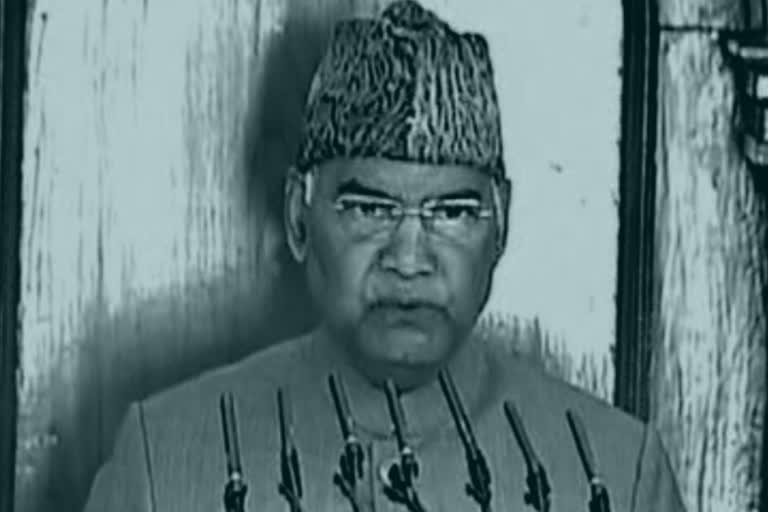New Delhi: In his address to the joint sitting of the Parliament, President Ram Nath Kovind on Friday said that the Centre's decision to enact Citizenship Amendment Act (CAA) is a move to fulfil the wishes of Mahatma Gandhi and that its step to abrogating Article 370 and 35A from Kashmir was "historic".
Noting that the Constitution protects the rights of every citizen, Kovind, however, mentions that the citizens should also be mindful of their duties and that "the decisions taken through democratic processes will be accepted by the countrymen".
Also read: Rapid development of J-K, Ladakh among priorities of govt: Prez
At the same time, our Constitution expects the Parliament and every member present in this House to fulfil the hopes and aspirations of the countrymen and make the necessary laws, keeping the national interest paramount, he said.
Talking about the CAA, which came into force on January 10 after the Parliament passed it in the Winter Session last year, the President said Father of the Nation Mahatma Gandhi had said that Hindus and Sikhs of Pakistan, who do not wish to live there, can come to India.
"Many national leaders and political parties have from time to time supported this idea of Pujya Bapu and further propagated it. It is our responsibility to honour this wish of the founding fathers of our nation. I am happy that both the Houses of Parliament have fulfilled this wish, by enacting the Citizenship Amendment Act."
Referring to the January 4 attack on the Nankana Sahib Gurdwara in Pakistan, birthplace of Guru Nanak Dev, the President said that we have all been witness to the increase in the atrocities on minorities in Pakistan over the time.
"... It is the responsibility of all of us to bring the atrocities being committed in Pakistan to the notice of the global community."
While condemning the atrocities on the minorities in Pakistan, the President said: "I urge the world community to take cognizance of it and take necessary steps in this regard."
In the backdrop of violent protests against CAA, the President clarified that the procedures which have existed for people from all faiths of the world who believe in India and who wish to obtain Indian citizenship remain "unchanged".
"A person of any faith can follow these processes and become a citizen of India. The Government has made several provisions to ensure that granting citizenship to those who have been compelled to take shelter in India does not have any adverse cultural impact on any region, especially the North East."
He condemned that violent protests, saying "my government is of the firm view that mutual discussions and debates strengthen democracy".
"At the same time, any kind of violence in the name of protests weakens the society and the nation."
As per the law, migrants of six non-Muslim communities -- Hindu, Sikh, Buddhist, Jain, Parsi and Christian -- who have come from Pakistan, Bangladesh and Afghanistan till December 31, 2014, will be given Indian citizenship.
The law sparked countrywide protests and violence at some places in which about 25 people were killed. Over 2,000 people have been arrested and around 5,000 detained while protesting against the CAA.
On abrogation of Article 370 and 35A, the President said: "Today, after seven decades, the whole country is happy that the dream of crores of freedom fighters has come true and the people of Jammu-Kashmir and Ladakh, the Dalits and women from that area have also got the same rights as the people in the rest of the country."
The abrogation of Article 370 and Article 35A of the Constitution by a two-thirds majority in both Houses of Parliament is not only "historic" but has also paved the way for the equitable development of Jammu - Kashmir and Ladakh, he said.
"Through this House, I heartily congratulate the people of Jammu - Kashmir and Ladakh for joining the mainstream of development," the President said.
The government on August 5 abrogated Article 370 and 35A from Jammu and Kashmir, which gave the erstwhile state a special status.
The President also lauded the Supreme Court's verdict on Ram Janmabhoomi and people's maturity displayed over the order. Mentioning "nothing is more sacred than the mandate given by the people", the President said the people of the country have given this mandate to "my government for the making of a new India".
Referring to the beginning of the third decade of the 21st century, the President appealed to all the MPs from both Lok Sabha and Rajya Sabha to work together to ensure the making of new India.
Also read: Economic Survey 2019-20: India needs an investment of $1.4 trillion in infrastructure sector
"With the efforts of my government, a strong foundation has been laid in the last five years, to make this decade India's decade and this century India's century," the President said.
He addressed the joint sitting of the Parliament before the beginning of the Budget session. The first part of the session began on Friday and will go on till February 11, after which the session will be adjourned for a recess. The second half of the session will commence from March 2 and will go on till April 3.



